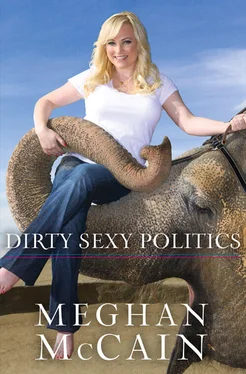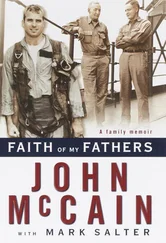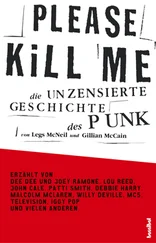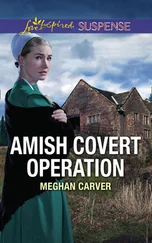What are her politics really like? Is she ready for this? What went through my head that night, and probably went through yours, were questions and more questions. To be honest, her family didn’t seem ready for what was about to hit them. The original cast from Saturday Night Live (where I once worked) was called “The Not Ready for Prime Time Players.” That’s what the Palins looked like: not ready for prime time. They were so unprepared, in fact, that they were eerily calm, as though oblivious about what would come—the intrusions, distortions, and heat of the spotlight. But, I thought, maybe that’s a good thing. The country was clearly ready for something different and organic and original. Sarah and her family were nothing if not that.
Was she truly a maverick like my dad? I knew virtually nothing about her, and the more I thought about all the other people who’d been passed over, particularly Joe Lieberman, an icy slap of panic hit me. Who is this person we’ve put so much of our trust in? And please, God, don’t let her have any horrible skeletons in her closet.
Once the speech was done, and the world had its chance to meet Sarah Palin for the first time, my job was to work the rope line and pose for lots of photographs. This is basically an animated, vocalized version of my onstage role as cardboard political prop. That day, in my Meggie Mac mode, I talked about how excited I was about my father’s campaign and his running mate, and kept my panic to myself.
After the rope line, we went upstairs—members of both families—for a People magazine shoot that I hadn’t known about. I was a living mess, and feeling worse every second, and barely able to look at my mother. The photographer herded us together, frantically trying to make visual sense of us, but it was a daunting task.
Later, my mother and I met, hoping to clear the air. We discussed a number of things that troubled both of us—the mysterious selection process, as well as the selection of Sarah herself. I told my mother how blindsided I felt. It was an uncomfortable conversation and, in many ways, opened up more uncomfortable subjects. Over the past fourteen months, I had felt pretty knowledgeable about the inner workings of the campaign. Suddenly I realized that I was pretty naïve and I had been kept in the dark about many things.
Sarah Palin had been chosen in secret, apparently by the campaign advisers Steve Schmidt, Charlie Black, Mark Salter, and Rick Davis. She had been vetted quickly and when she passed, she had been invited to Sedona, where my family has a ranch—as had all the other potential running mates—to meet my mom and dad.
After our talk, I felt better about a few things. Namely, I stopped blaming my parents for keeping me in the dark about a decision that was so important, not just to the campaign but to my family personally. I realized it had been truly a collective campaign decision—made by my father and advisers and professionals whom he trusted and liked. I was an outsider, even on my father’s campaign. In some ways, it had been my own choosing. My parents were probably smart to keep me out of the loop. If they had told me about Sarah Palin earlier, I would have discussed it with Shannon and Heather. Like I said, there are no secrets. So don’t tell me one.
As all of these revelations were sinking in, I began to feel scared in a way that I had never been before—and felt different about the outcome of the election. Before, I had always felt certain that my dad would get the nomination and win. I had never doubted it. But now I was worried. How the Palin selection process and announcement had been handled seemed to highlight things that were innately wrong with our campaign and with the tactics of Steve Schmidt. It was a risky move—one of those things that can wind up being genius or the stupidest decision of all time. More than anything, it seemed like gambling.
Like my father, I have always been more of a craps girl than a strategic poker player. Actually, roulette is my favorite game. Screw it, I thought. Let’s spin the wheel and see where the ball winds up.
Chapter 4
The Birth of Blogette
When I first joined the campaign, it was hard to get into the pace—or figure out what my role would be. I wanted to find a way to fit in, stay out of trouble, and contribute something of value. The campaign was a small band in those days, a tight group. My real job as a daughter-of was mostly cosmetic and decorative. I was supposed to stand straight, wave, smile, and look nice, but not too nice. (No skin, no bling! ) But I wanted to contribute more.
I’m sure there was some eye-rolling at campaign headquarters when word got out that I wanted to write a blog. As anybody who’s interned or worked in their mom’s or dad’s office knows, you can get pegged as a raging brat really fast. The smell of entitlement oozes from your skin and follows you around like a cloud, no matter what you do.
But as serendipity would have it, Rick Davis was running the campaign in those days. Rick is charming—a handsome older-guy type with wire-rim glasses and old-school suits and ties. He always picked up the phone when I called, and laughed at my jokes. He believed in me or, at least, had the good manners to act like it. He cut me some slack, the way my dad always did. And I needed it.
Let’s face it. As far as politics went, I was hardly a super-skilled professional. I had just graduated from Columbia with a degree in art history, an academic discipline that I love and was serious about in college. I had no experience in fieldwork or political strategy. Aside from my shit detector and gut, which, thank God, were often on target, I knew very little about campaigning.
But I do have a sixth sense about the Internet, and an ability to combine large amounts of information and create a focused, toned-down segment. I had worked as a paid summer intern for Newsweek magazine and followed a number of blogs. This, combined with the fact that I’m a nonstop extrovert, a people person who loves mingling and gabbing and getting out in the world, a blog that chronicled my days on the campaign—and showed the silliness and madness, as well as the seriousness—seemed like a perfect idea. Sheer genius! Or so I thought.
My mother loved the idea, became my biggest supporter, and pushed pretty hard for the campaign to let me do it. Once I had agreed to pay for all the costs of the blog, including staff and travel, how could they turn me down? Still, it took convincing and a fair amount of drama and, of course, lawyers had to get involved.
But I am stubborn, and always have been—and I was determined to make it happen and used voter demographics to argue my case. The audience that I would reach with a blog, or hoped to, was one that all the collected eggheads of my father’s campaign—the strategists and polling experts—had the most trouble with: young moderates and independents. The Republican National Committee had raised and spent millions of dollars on market research, and come up with zillions of ideas about using the Internet, but we had little presence there.
Republicans “got” radio. Conservatives were heard, loud and clear, on those airwaves. But aside from viral lies and mudslinging, like the Swift Boat Campaign against John Kerry, which was a really shameful moment in political history, the party just didn’t get the digital scene. What year was this? 2007. And the presidential campaign was poised to be groundbreaking in terms of communication tactics and media. Digital was definitely the place to be. For a political candidate, the blogosphere was exciting, persuasive, and reached voters instantly. Best of all, aside from production costs, it was free. There was Facebook, MySpace, and a day didn’t go by without YouTube. The old world of print journalism was making a crash landing.
Читать дальше












